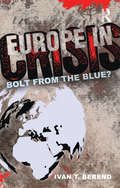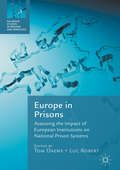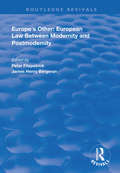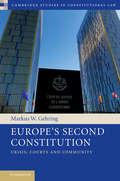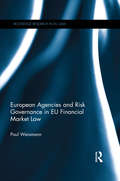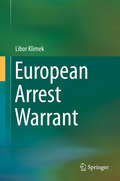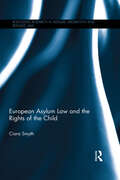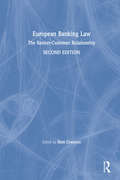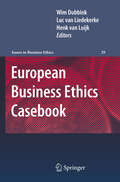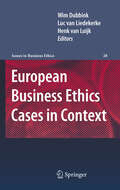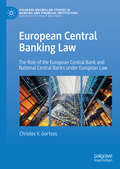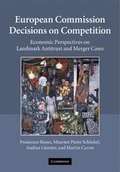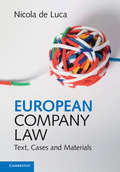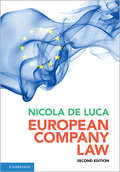- Table View
- List View
Europarecht
by Walter FrenzEuroparecht ist vor allem Fallrecht anhand aktueller Entscheidungen. Diese werden in diesem Lehrbuch ausführlich dargestellt, so zu den Grenzen der Finanzhilfe für Griechenland (Urteil Pringle), der Ökostromförderung (Urteil Alands Vindkraft) sowie der zu gewährenden Sozial- und Gesundheitsleistungen (Urteile Hartz IV und Abdida). Breiten Raum nehmen auch die Verschränkungen von Unions- und nationalem Recht (OMT-Vorlagebeschluss des BVerfG; PKW-Maut), die Grundrechte (Datenschutz) sowie das Wettbewerbsrecht (Microsoft, Amazon, Energiewende) ein. Zahlreiche Übersichten und Fälle mit Musterlösung veranschaulichen den Stoff. Bereits eingearbeitet ist das Urteil des EuGH zum Ankauf von Staatsanleihen auf dem Sekundärmarkt.
Europarecht: Mit Klimaschutz, Digitalisierung, Corona, ausführlichem Datenschutz (Springer-Lehrbuch)
by Walter FrenzDieses Lehrbuch zum Europarecht nimmt vor allem die aktuellen Entwicklungen in den Blick. Die Corona-Krise ist bereits ausführlich berücksichtigt (Coronahilfen, Schutzansprüche, Impfpflicht, Einstieg in die Fiskalunion?); Klimaschutz (EU-Klimagesetz, Green Deal, Anspruch auf mehr Klimaschutz?, Kohleausstieg) und Digitalisierung sind in eigenen Kapiteln dargestellt. Aber auch die klassischen Materien haben sich fortentwickelt, insbesondere durch die Rechtsprechung, die ausführlich in zahlreichen Beispielen und Fällen mit Musterlösung (Ökostromförderung, CETA-Abkommen) wiedergegeben ist. So werden die Grundfreiheiten immer schärfer geprüft (Pkw-Maut), ebenso die Grundrechte (EU-Haftbefehl, Vorratsdatenspeicherung). Herausragende Bedeutung hat der Datenschutz in diversen aktuellen Judikaten, die detailliert und kritisch dargestellt sind – auch in ihren Konsequenzen etwa für eine Corona-Warnapp. Besonderes Gewicht hat das Verhältnis von Unions- und nationalem Recht: Ist das BVerfG entsprechend seinem PSPP-Urteil Richter über den EuGH? Ist es umgekehrt nach seinem Recht auf Vergessen II-Judikat ein Garant der EU-Grundrechte? Die begleitend angebotene SN Flashcards Lern App bietet exklusives Zusatzmaterial und erhöht den Lernerfolg zusätzlich.
Europe and Asia as a Legal Area for Fundamental Rights
by Masahisa Deguchi Kimio YakushijiThis book explores the possibility of an Asian legal sphere based on the model of Europe. It features articles written by leading experts from Europe and Asia. After centuries of violent conflicts, Europe began a process of integration which leads to 75 years of peace and a community with the common values of freedom, fundamental rights, and the rule of law. But the circumstances that lead to the unification of Europe differ from current-day Asia: Besides the huge economic gaps between neighboring countries and a wide variety of political forms of government, Asia also does not share the unifying narrative of post-WWII Europe.From an economic point of view, Asia is a highly developed region; despite the differences between the political systems, the region has grown together—economically and in recent times also politically. However, the legal systems of the respective countries have not created the necessary conditions for a peaceful coexistence. Can Europe be a model for Asia? Based on the history and development of the European unification process, this book asks the question to what extent Asia can look to Europe as a model and what lessons can be learned.
Europe in Crisis: Bolt from the Blue? (Variorum Collected Studies #739)
by Ivan BerendThis book analyzes the European Great Recession of 2008-12, its economic and social causes, its historical roots, and the policies adopted by the European Union to find a way out of it. It contains explicit debates with several economists and analysts on some of the most controversial questions about the causes of the crisis and the policies applied by the European Union. It presents the cases of Iceland, Greece and Ireland, the countries that first declined into crisis in Europe, each of them in a different way. Iceland is a case study for reckless banking practices, Greece of reckless public spending, and Ireland of reckless household indebtedness. At least seven other countries, mostly from the peripheries of Europe, had similarly reckless banking and spending practices. In the center of the book are the economic and social causes of the crisis. Contemporary advanced capitalism became financialized, de-industrialized and globalized and got rid of the "straitjacket" of regulations. Solid banking was replaced by high-risk, "casino-type" activity. The European common currency also had a structural problem — monetary unification without a federal state and fiscal unification. The other side of the same coin is European hyper-consumerism. A new lifestyle emerged during two super-prosperous periods in the 1950s to 1960s, and during the 1990s to 2006. Trying to find an exit policy, the European Union turned to strict austerity measures to curb the budget deficit and indebtedness. This book critically analyzes the debate around austerity policy. The creation of important supra-national institutions, and of a financial supervisory authority and stability mechanisms, strengthens integration. The correction of the euro’s structural mistake by creating a quasi-fiscal unification is even more important. The introduction of mandatory fiscal rules and their supervision promises a long-term solution for a well-functioning common currency. These measures, meanwhile, create a two-tier European Union with a fast-track core. This book suggests that the European Union will emerge stronger from the crisis. This book will be of particular interest to students and researchers of economics, history, political science and international finance, but will also prove profitable reading for practitioners and the interested public.
Europe in Prisons
by Tom Daems Luc RobertThis volume explores the role that European institutions have come to play in regulating national prisons systems. The authors introduce and contribute to advancing a new research agenda in international penology ('Europe in prisons') which complements the conventional comparative approach ('prisons in Europe'). The chapters examine the impact - if any - that institutions such as the European Committee for the Prevention of Torture and Inhuman or Degrading Treatment or Punishment and the European Court of Human Rights have had on prison policy throughout Europe. With contributions from a wide range of countries such as Albania, Austria, Belgium, Ireland, Norway and Spain, this edited collection offers a wide-ranging and authoritative guide to the effects of European institutions on prison policy.
Europe in the Global Space Economy (SpringerBriefs in Space Development)
by Clelia Iacomino Patrizia CaraveoThis book analyzes the policies and space economy programs of major space-faring nations and explores whether the present institutional set-up in Europe is adequate to address the challenges. At the core of the discussion are the relative roles of governments and markets in a highly dynamic panorama that involves advancements in science, modifications in technology and organization, and the introduction of new rules of behavior. After a close examination of the history of development of the space economy, and the shift from the centralized model to deregulation and the opening up of space activities to commercial companies, a wide-ranging overview of global space governance is provided. National and regional perspectives are discussed, and the current role of commercial actors in the global space system is elucidated. The various challenges faced by Europe are then examined, including the threat posed by institutional and market fragmentation to the emergence of European companies able to compete with companies of nations such as the USA. The final part of the book analyzes proposals for reforming of the space system in Europe and offers a vision for future European space policy.
Europe's Other: European Law Between Modernity and Post Modernity (Routledge Revivals)
by Peter Fitzpatrick James Henry BergeronFirst published in 1998, this volume focuses critically on the European identity of the law of the European Union, of national law and the law of human rights. It is primarily concerned with the ways in which European identity is created through the rejection of a malign Other constituted in opposition to all that a virtuous Europe and its law, are supposed to be. The construction of this Other is explored in claims of the EU legal order to a unity and coherence transcending the nation-state; in the assertion of a European identity through laws effecting cultural, immigration and security policies; and in the claims to a lofty 'European-ness' made by national law and the European Convention on Human Rights. A major contribution to the understanding of European Law in the terms of the debates over modernity and postmodernity, this book will interest those involved with studies of the European Union and its law, with critical legal studies and also with socio-legal studies.
Europe's Second Constitution: Crisis, Courts and Community (Cambridge Studies in Constitutional Law #24)
by Markus W. GehringThe process of European constitutionalisation is met with extensive scepticism in current national legal and political spheres and in broader circles of public opinion across Europe. By shedding light on these concerns, this book reveals a widespread misunderstanding of constitutional federalism, which permeates the Member State courts, popular media, and many academic communities. A failure to address confusion over this fundamental concept is leading us towards impoverished development of the EU's 'Second Constitution', and even ensuring that the role of both domestic and international European courts in enriching the constitutionalisation process is overlooked and undervalued. In a bid to avoid such consequences, this book explores how federalism and further constitutionalisation - rightly understood in a dialogue of the European courts - may actually change this process and allow a clearer advance toward Europe's Second Constitution for, but also with, the people of Europe.
European Agencies and Risk Governance in EU Financial Market Law (Routledge Research in EU Law)
by Paul WeismannThe phenomenon of ‘agencification’ describes the EU legislator’s increasing establishment of European agencies to fulfil tasks in a variety of EU policies. The creation of these decentralised administrative entities raises a number of questions; for example, on the limits to such delegation of powers, on the agencies’ institutional development and possible classification, and on the role of comitology committees as an institutional alternative. This book examines the EU’s ‘agencification’ with regard to these questions, on the basis of and with reference to which the focus is laid on the European agencies operating in the field of financial market risk governance. This analysis not only encompasses the three European Financial Market Supervisory Authorities (the ESAs), but also takes into account the institutional change brought about by the Banking Union, more specifically the Single Supervisory Mechanism (SSM) and the Single Resolution Mechanism (SRM). While the SRM sets in place a new European agency, the Single Resolution Board (SRB), the SSM establishes and empowers a new body within the organisation of the European Central Bank (ECB), the Supervisory Board. By exploring the organisation, the tasks and the powers of these actors in financial market regulation and supervision, the book points at the current peak of the institutional development of European agencies and assesses organisation and unprecedented powers with a view to their compliance with EU law, in particular the Treaties and the respective case law of the European courts. As an evaluation of various aspects of the progressing centralisation of regulatory power on the EU level, which is exercised by an increasingly decentralised administrative apparatus, this book will be of great interest and use to students and scholars of EU law, financial law and regulation, and European politics.
European Agricultural Policy: History and Analysis
by Gianluca Brunori Franco SotteThis book presents the European Common Agricultural Policy by tracing its crucial stages from its conception to the present days. It reconstructs the negotiating processes that have taken place at the political and institutional level over the years. At the same time, the book brings together the results of analyses made by agricultural policy scholars to propose solutions, and to evaluate the policies adopted and the results they produced. The book takes on a twofold objective: to understand how many of today’s problems have roots whose branches extend back in time, and to draw, from the lessons of history, useful insights for endowing the European Union with an ambitious agricultural and rural development policy, suited to the challenges ahead.
European Arrest Warrant
by Libor KlimekThis book examines the European arrest warrant as a successful and effective instrument for judicial co-operation in criminal matters in the European Union. Providing comprehensive content and combining theoretical and practical aspects, it covers all of the major issues surrounding the European arrest warrant. The book analyses its genesis, main features, surrender procedure, case law, implementation and the latest developments. Instead of focusing solely on a criminal law approach, it also considers the subject from the perspective of European Union law and constitutional law.
European Asylum Law and the Rights of the Child: European Asylum Law And The Rights Of The Child (Routledge Research in Asylum, Migration and Refugee Law)
by Ciara SmythThe child asylum seeker poses unique challenges for reception and refugee status determination systems, not least because the child is entitled to have his or her rights as a child respected as a matter of international and regional human rights law. In the last decade the European Union has increasingly engaged with children’s rights, with the entry into force of the Lisbon Treaty in December 2009, and a new Article 3(3) of the Treaty on European Union that commits the Union to promoting the ‘protection of the rights of the child.’ This book addresses the question of whether the Common European Asylum System (CEAS) complies with the rights of the child. It contrasts the normative standards of international child rights law with the treatment of child asylum seekers and refugees in the CEAS. Ciara Smyth identifies the attributes of the rights of the child that are most relevant to the asylum context and systematically examines whether and to what extent those attributes are reflected in the CEAS legislation. The book goes on to assess whether the CEAS instruments direct Member States to comply with the rights of the child, offering a comprehensive examination of the place of the child within European asylum law and policy. The book will be of great use and interest to scholars and students of international law, immigration and children’s rights studies.
European Banking Law: The Banker-Customer Relationship
by Ross CranstonThis text presents a practical analysis of the private law of banking transactions. Rooted in contract, the banker-customer relationship is overlaid with a range of rights and obligations having their derivation in tort, delict, notions of equity, good faith and statute. The book looks at some questions that arise within the banker-customer relationship in various European jurisdictions. What are the nature and consequences of the banker-customer relationship? Is there a duty on banks to advise customers and others about particular dealings and what liability arises if any advice given is wrong? What security can a bank take to protect itself as lender?
European Banking and Financial Law
by Matthias Haentjens Pierre de Gioia-CarabelleseIn recent decades, the volume of EU legislation on financial law has increased exponentially. Banks, insurers, pension funds, investment firms and other financial institutions all are increasingly subject to European regulatory rules, as are day to day financial transactions. Serving as a comprehensive and authoritative introduction to European banking and? financial law, the book is organized around the three economic themes that are central to the financial industry: (i) financial markets; (ii) financial institutions; and (iii) financial transactions. It covers not only regulatory law, but also commercial law that is relevant for the most important financial transactions. It also explains the most important international standard contracts such as LMA loan contracts and the GMRA repurchase agreements. Covering a broad range of aspects of financial law from a European perspective, it is essential reading for students of financial law and European regulation.
European Banking and Financial Law 2e
by Matthias Haentjens Pierre de Gioia CarabelleseOver the last few decades, banks, insurers, pension funds, investments firms and other financial institutions have become subject to sometimes dramatically new, but always substantially more, legislation. This is especially true for the EU. Moreover, Brexit has already caused profound changes to the dynamics of EU financial regulation, and its effects will likely become ever-more significant in the years to come. This book serves as a comprehensive introduction to these developments, and, more generally, to European banking and financial law. It is organised around the three economic themes that are central to the financial industry: (i) financial markets, (ii) banking and financial institutions and (iii) financial transactions. It covers not only regulatory law but also commercial law that is relevant for the most important financial transactions. This Second Edition has been completely revised. The basic structure of the First Edition has been maintained, but all chapters have been thoroughly rewritten and restructured. Attention is now also given to topics such as shadow banking and credit rating agencies. As a matter of course, all new relevant legislation and case law has been included. In addition, on the basis of real-life classroom experience, student questions and further reading suggestions have been updated and expanded.
European Banking and Financial Law Statutes
by Matthias Haentjens Pierre de Gioia CarabelleseEuropean Banking and Financial Law Statutes presents all the key legislation for European banking and financial law in one student-friendly volume. This book is: • up-to-date with the law: based on the official consolidated texts of all relevant European instruments, this book provides a fully current collection of legislation • tailored to course outlines: content has been curated to align with European banking and financial law courses • exam friendly: conforming to regulations, this is an un-annotated text that is suitable for exam use • easy to use: a clear and attractive text design, detailed table of contents and multiple indices provides ease of reference and navigation. Ideal for course and exam use, as well as for reference, this book is a perfect companion resource for student learning and exam success, which is especially tailored for use in combination with the European Banking and Financial Law textbook.
European Business Ethics Casebook
by Wim Dubbink Henk Van Luijk Luc Van LiedekerkeBusiness cases are at the heart of business ethics as a discipline. Analysis and reflection on the morality of business often is triggered by concrete cases. After four introductory chapters into recent developments within business ethics and the value of case analysis, the present volume offers extensive description of eight recent European cases, mainly stemming from The Netherlands and Belgium and all of them with a clear moral impact. Among them are the Lernout and Hauspie speech technology disaster, Heineken struggle with the promotion girls selling beer in Cambodia, cartels in the Dutch construction industry, the pharmaceutical industry and the Aids crisis, and Unilever allegedly making use of child labour in the cotton industry in India. The book will be of interest to researchers as well as teachers of undergraduate and graduate courses in Business Ethics, Business in Society, Management and Organisation Theory and Strategic Management. It will also be useful for business practitioners eager to learn about business ethics by means of cases.
European Business Ethics Cases in Context
by Wim Dubbink Henk Van Luijk Luc Van LiedekerkeBusiness ethics as a discipline leans on cases but flourishes by thorough analysis and reflection. The present volume offers both. After three introductory chapters into business ethics eight recent European cases, mainly stemming from The Netherlands and Belgium and all of them with a clear moral impact, are extensively described and analysed. Among them are the Lernout and Hauspie speech technology disaster, Heineken's struggle with the promotion girls selling beer in Cambodia, cartels in the Dutch construction industry, the pharmaceutical industry and the Aids crisis, and Unilever allegedly making use of child labour in the cotton industry in India. Each case is followed by two expert comments, from the fields of general ethics, but also of law, economics, management and organisation theory, sociology and social psychology. Cases and comments together offer an unique entrance in varieties of moral reasoning and in the personal and institutional dimensions to be taken into account when facing a corporate case saturated with moral ambiguities. This book will be of interest to researchers as well as teachers of undergraduate and graduate courses in Business Ethics, Business in Society, Management and Organisation Theory and Strategic Management. It will also be useful for business practitioners eager to find moral guidance in their specific field.
European Central Banking Law: The Role of the European Central Bank and National Central Banks under European Law (Palgrave Macmillan Studies in Banking and Financial Institutions)
by Christos V. GortsosThis book provides a comprehensive overview of European Union (EU) central banking law, a field of EU economic law which emerged in the late 1990s and has developed rapidly ever since. European central banking law pertains to the rules governing the functions, operation, tasks and powers of the European Central Bank (ECB) and the national central banks (NCBs) of EU Member States. Systematically presenting and analysing the role of the ECB as a monetary and banking supervisory authority, the book discusses its changing and developing responsibilities following the financial crisis of 2007-2009 and the ongoing fiscal crisis in the euro area. The book also highlights the ECB’s significant role in relation to the resolution of credit institutions, as well as, conversely, its relatively limited role in respect of last-resort lending to EU credit institutions exposed to liquidity risk.The related tasks and powers of the ECB are presented in light of its interaction with NCBs within the Eurosystem, the European System of Financial Supervision, the Single Supervisory System and the Single Resolution Mechanism. Providing a detailed analysis of the legal framework governing (mainly) the ECB’s monetary policy and other basic tasks within the Eurosystem and its specific tasks in relation to banking supervision and macro-prudential financial oversight, this comprehensive book will be of interest to researchers, practitioners and students in the fields of EU monetary and banking law.
European Commission Decisions on Competition
by Francesco Russo Maarten Pieter Schinkel Andrea Günster Martin CarreeEuropean Commission Decisions on Competition provides a comprehensive economic classification and analysis of all European Commission decisions adopted pursuant to Articles 101, 102 and 106 of the FEU Treaty from 1962 to 2009. It also includes a sample of landmark European merger cases. The decisions are organized according to the principal economic theory applied in the case. For each economic category, the seminal Commission decision that became a reference point for that type of anticompetitive behavior is described. For this, a fixed template format is used throughout the book. All subsequent decisions in which the same economic principle was applied are listed chronologically. It complements the most widely used textbooks in industrial organization, competition economics and competition law, to which detailed references are offered. The book contains source material for teachers and students, scholars of competition law and economics, as well as practising competition lawyers and officials.
European Company Law
by Nicola De LucaTaking a text, cases and materials approach, this is the first and only student textbook on European company law, providing an insight into the subject and shedding light on its future development. Textboxes for explanatory commentary, cases and materials - such as EU legislation, official documents and excerpts from scholarly papers - are clearly differentiated from the text, allowing the student to quickly identify sources. Each chapter also includes suggestions for further reading. Structured in seven parts, the book explores a diversity of topics, from what European company law is, the common rules for establishing, financing and accounting a company, and corporate governance, to the structure of the Societas Europaeca Statute, EU company law directives, capital markets and takeover law, and insolvency. An essential resource for the growing number of graduate courses on European company law, European business law, and comparative corporate law.
European Company Law: Text, Cases And Materials
by Nicola de LucaTaking a text, cases and materials approach, de Luca's successful textbook remains the only offering for students of European company law, and has been thoroughly updated in this new edition. Chapters have been expanded to cover the latest legislation and directives on cross-border mergers, the use of digital tools, and cross-border insolvency, while figures and graphs have been introduced to help illustrate complex processes and relationships. Clearly differentiated explanatory textboxes from the first edition have been revised, and allow students to quickly identify sources such as EU legislation, official documents and excerpts from scholarly papers. The book explores a diverse range of topics, from what European company law is, to the structure of the Societas Europaea Statute, capital markets and takeover law. It continues to be an essential resource for the growing number of graduate courses in European company law, European business law, and comparative corporate law.
European Comparative Company Law
by Mads Andenas Frank WooldridgeCompany law is undergoing fundamental change in Europe. All European countries have undertaken extensive reform of their company legislation. Domestic reform has traditionally been driven by corporate failures or scandals. Initiatives to make corporate governance more effective are a feature of recent European law reform, as are measures to simplify and ease burdens on smaller and medium-sized businesses (SMEs). An increasing EU harmonisation is taking place through the Company Law Directives, and the free movement of companies is also facilitated by the case law of the European Court of Justice on the directives and the right to free movement and establishment in the EC Treaty. New European corporate forms such as the European Economic Interest Grouping (EEIG) and the European Company (SE) have added new dimensions. At a time of rapid development of EU and national company laws, this book will aid the understanding of an emerging discipline.
European Competition Policy and Globalization
by Terrence R. Guay Chad DamroThis book examines the domestic and international dimensions of European Union (EU) competition policy, particularly mergers, anti-competitive practices and state aids. The authors argue that important changes in EU competition policy are having profound effects on the global political economy, and these changes are best understood as European Commission responses to new domestic and international pressures. Using a two-level game analytical framework that is both intra-EU and global in scope, Damro and Guay investigate a wide variety of domestic and foreign public and private actors that interact in crucial ways to determine the development and implementation of EU competition policy. They address this broad question: In what ways do changing external and internal factors affect the evolution of the EU's competition policy and the role that the Commission plays in it? Among the conclusions is that the EU – and particularly the European Commission – has become a leading global regulator.
European Competition Policy and Globalization (Palgrave Studies In European Union Politics Ser.)
by Chad Damro Terrence GuayThis book examines the domestic and international dimensions of European Union (EU) competition policy, particularly mergers, anti-competitive practices and state aids. The authors argue that important changes in EU competition policy are having profound effects on the global political economy, and these changes are best understood as European Commission responses to new domestic and international pressures. Using a two-level game analytical framework that is both intra-EU and global in scope, Damro and Guay investigate a wide variety of domestic and foreign public and private actors that interact in crucial ways to determine the development and implementation of EU competition policy. They address this broad question: In what ways do changing external and internal factors affect the evolution of the EU's competition policy and the role that the Commission plays in it? Among the conclusions is that the EU – and particularly the European Commission – has become a leading global regulator.



